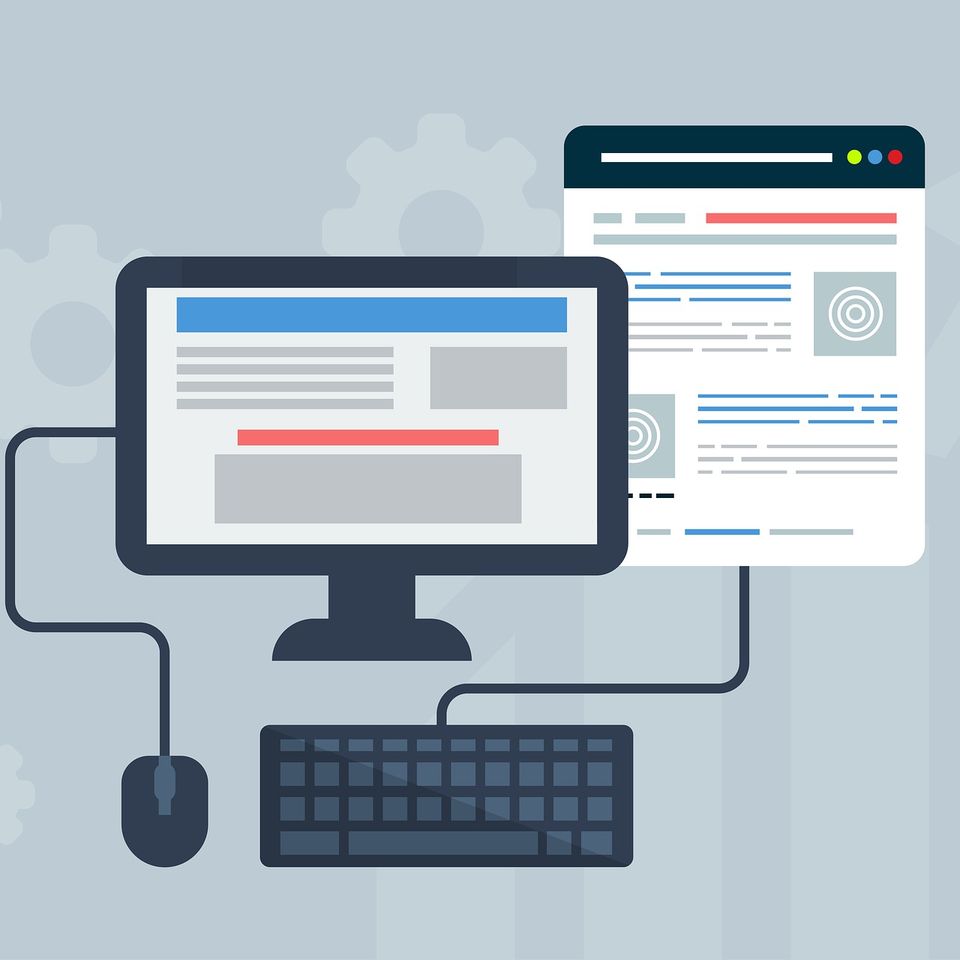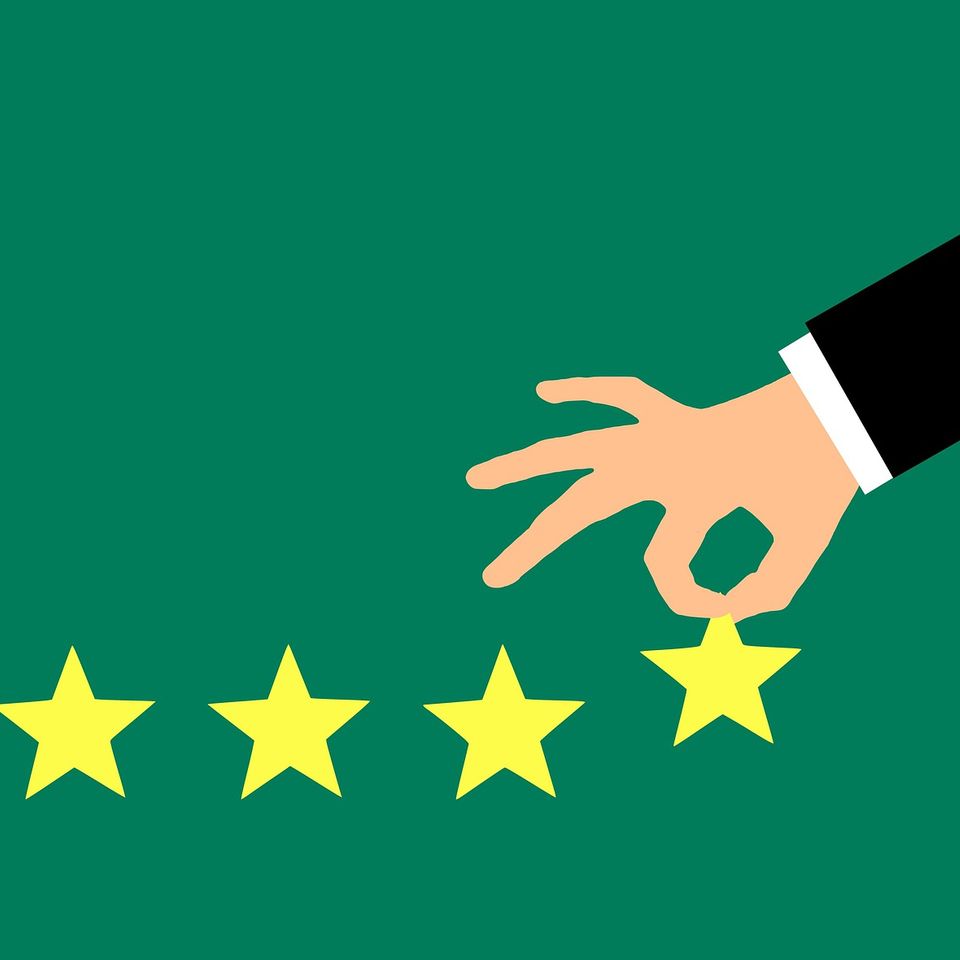OUR BLOG.

5 Reasons Why You Need A Website
Having a website can offer various benefits, both personally and professionally. Here are five reasons why you might need a website:
Online Presence: In today's digital age, having an online presence is crucial. A website serves as a virtual storefront or resume, allowing you to showcase your personal or professional brand to a global audience. It's an essential tool for establishing credibility and visibility.
Brand Building: A website is a powerful tool for brand building. You can use it to communicate your brand's values, mission, and unique selling points. By consistently delivering your message and showcasing your products or services, you can create a strong and memorable brand presence.
Accessibility and Convenience: Websites are accessible 24/7, providing a convenient way for people to learn about you or your business at any time. This can be especially important for businesses, as customers can access information, make inquiries, or even purchase products and services at their convenience.
Marketing and Promotion: Your website can serve as a central hub for your marketing efforts. You can use it to publish blog posts, share news, promote events, and engage with your audience through social media integration. It's a versatile platform for promoting your products, services, and content.
Credibility and Trust: Having a professional website can help build trust and credibility with your audience. A well-designed website can convey that you are a reputable and legitimate entity. It also allows you to provide contact information, customer testimonials, and other information that can reassure visitors about your authenticity and reliability.
Remember that the specific reasons for needing a website can vary depending on your goals, whether you're an individual, a business, an organization, or a creative professional. However, in the digital age, a website can be a valuable asset for most people and entities looking to connect with a wider audience, provide information, and achieve their goals.
Online Presence: In today's digital age, having an online presence is crucial. A website serves as a virtual storefront or resume, allowing you to showcase your personal or professional brand to a global audience. It's an essential tool for establishing credibility and visibility.
Brand Building: A website is a powerful tool for brand building. You can use it to communicate your brand's values, mission, and unique selling points. By consistently delivering your message and showcasing your products or services, you can create a strong and memorable brand presence.
Accessibility and Convenience: Websites are accessible 24/7, providing a convenient way for people to learn about you or your business at any time. This can be especially important for businesses, as customers can access information, make inquiries, or even purchase products and services at their convenience.
Marketing and Promotion: Your website can serve as a central hub for your marketing efforts. You can use it to publish blog posts, share news, promote events, and engage with your audience through social media integration. It's a versatile platform for promoting your products, services, and content.
Credibility and Trust: Having a professional website can help build trust and credibility with your audience. A well-designed website can convey that you are a reputable and legitimate entity. It also allows you to provide contact information, customer testimonials, and other information that can reassure visitors about your authenticity and reliability.
Remember that the specific reasons for needing a website can vary depending on your goals, whether you're an individual, a business, an organization, or a creative professional. However, in the digital age, a website can be a valuable asset for most people and entities looking to connect with a wider audience, provide information, and achieve their goals.

Mechanics Of Great Web Design
Designing a website involves several key steps and considerations to create an effective and visually appealing online presence. Here's a general overview of the website design process:
Define Your Goals:
Remember that web design is an ongoing process, and staying up-to-date with design trends and technology is essential to keep your website relevant and effective. Additionally, seeking feedback from users and making improvements based on their input can lead to a better user experience.
Define Your Goals:
- Determine the purpose of your website: Is it for personal blogging, business, e-commerce, portfolio, or something else?
- Identify your target audience and their needs.
- Conduct market research to understand your competition and industry trends.
- Create a sitemap or outline of your website's structure, including the main pages and their hierarchy.
- Select a domain name that reflects your brand or content.
- Choose a reliable web hosting provider to store your website's files.
- Choose a design style that aligns with your brand or content.
- Create wireframes or mockups to plan the layout and structure of your pages.
- Consider the user experience (UX) and ensure the website is easy to navigate.
- Ensure your website is responsive, meaning it adapts to different screen sizes (desktop, tablet, mobile).
- Test your design on various devices and browsers.
- Select fonts, colors, and images that match your brand and design.
- Optimize images and graphics for fast loading times.
- Create high-quality and engaging content for your website, including text, images, videos, and other media.
- Use SEO best practices to optimize your content for search engines.
- Convert your design into HTML/CSS or use a CMS to build your website.
- Ensure proper coding standards for security and performance.
- Implement interactive features, such as contact forms, search bars, and e-commerce functionality if needed.
- Test all website functions thoroughly.
- Perform cross-browser testing to ensure compatibility.
- Test for speed and performance optimization.
- Check for broken links and errors.
- Optimize your website for search engines by using relevant keywords, meta tags, and other SEO techniques.
- Create an XML sitemap for search engine indexing.
- Implement security measures to protect your website from cyber threats.
- Keep your CMS and plugins/themes up to date.
- Once you're satisfied with the design, functionality, and content, launch your website.
- Monitor the website closely after launch for any issues.
- Regularly update and maintain your website to keep it fresh and secure.
- Add new content and features as needed.
- Promote your website through various online and offline marketing channels to drive traffic.
Remember that web design is an ongoing process, and staying up-to-date with design trends and technology is essential to keep your website relevant and effective. Additionally, seeking feedback from users and making improvements based on their input can lead to a better user experience.

Importance Of Having A GOOD Website
Having a good website is of paramount importance in today's digital age, and it can have a significant impact on various aspects of personal, professional, and business life. Here are some key reasons why having a good website is essential:
Online Presence: A website serves as your online identity. It allows individuals, businesses, and organizations to establish a digital presence, making them accessible to a global audience 24/7.
Credibility: A well-designed and professional website conveys trust and credibility. Visitors are more likely to trust a business or individual with a polished online presence.
Information Hub: Websites provide a central platform to share information about your products, services, or personal brand. You can showcase your expertise, portfolio, contact details, and more.
Marketing and Promotion: Websites are a cornerstone of digital marketing. They enable you to use various online marketing techniques, including SEO, content marketing, and social media integration, to reach and engage with your target audience.
E-commerce: For businesses, an e-commerce website allows you to sell products and services online. It expands your customer base and provides convenient shopping experiences.
Customer Engagement: Websites can be interactive, allowing for customer engagement through feedback forms, surveys, newsletters, blogs, and social media integration. This helps build relationships and gather valuable insights.
Accessibility: A website is accessible to anyone with an internet connection. This inclusivity is crucial for reaching a diverse audience, including people with disabilities.
Cost-Effective: Compared to traditional advertising and brick-and-mortar stores, maintaining a website is often more cost-effective. It's a one-time investment with minimal ongoing expenses.
Global Reach: A website breaks down geographical barriers and enables businesses and individuals to reach a global audience. It's an essential tool for international expansion.
Brand Building: Your website is an integral part of your brand identity. Consistency in design, messaging, and user experience reinforces your brand and helps distinguish you from competitors.
Competitive Advantage: In many industries, having a website is the norm. Without one, you risk falling behind your competitors who have a strong online presence.
Data and Analytics: Websites provide valuable data and analytics on visitor behavior, allowing you to refine your online strategy and make data-driven decisions.
Customer Support: Websites can offer customer support through FAQs, chatbots, or direct communication, providing a convenient way to address customer inquiries.
Showcase Portfolio: Artists, photographers, designers, and other creative professionals can use websites to showcase their portfolios, attracting potential clients and employers.
Educational Resources: Educational institutions and e-learning platforms can use websites to provide course materials, resources, and online classes to students.
Communication: Websites can serve as a communication hub for communities, organizations, or clubs, keeping members informed about events and news.
Instant Updates: Unlike traditional media, websites can be updated instantly, ensuring that your audience always has access to the most current information.
In summary, a good website is a versatile tool that can enhance personal and professional endeavors. It plays a pivotal role in establishing an online presence, building credibility, and reaching a wide audience, making it an essential asset in today's digital landscape. A website is the most visible face of any business. Potential customers are going to judge the quality of a business by the quality of their website. Even the finest business with a poorly designed website is going to make a bad impression. In today’s fast-paced world, the first impression is often the last impression. The connected customers of today (whom Google calls Generation ‘C’) are likely to quickly move on to the competition if a merchant's website design fails to attract them.
Online Presence: A website serves as your online identity. It allows individuals, businesses, and organizations to establish a digital presence, making them accessible to a global audience 24/7.
Credibility: A well-designed and professional website conveys trust and credibility. Visitors are more likely to trust a business or individual with a polished online presence.
Information Hub: Websites provide a central platform to share information about your products, services, or personal brand. You can showcase your expertise, portfolio, contact details, and more.
Marketing and Promotion: Websites are a cornerstone of digital marketing. They enable you to use various online marketing techniques, including SEO, content marketing, and social media integration, to reach and engage with your target audience.
E-commerce: For businesses, an e-commerce website allows you to sell products and services online. It expands your customer base and provides convenient shopping experiences.
Customer Engagement: Websites can be interactive, allowing for customer engagement through feedback forms, surveys, newsletters, blogs, and social media integration. This helps build relationships and gather valuable insights.
Accessibility: A website is accessible to anyone with an internet connection. This inclusivity is crucial for reaching a diverse audience, including people with disabilities.
Cost-Effective: Compared to traditional advertising and brick-and-mortar stores, maintaining a website is often more cost-effective. It's a one-time investment with minimal ongoing expenses.
Global Reach: A website breaks down geographical barriers and enables businesses and individuals to reach a global audience. It's an essential tool for international expansion.
Brand Building: Your website is an integral part of your brand identity. Consistency in design, messaging, and user experience reinforces your brand and helps distinguish you from competitors.
Competitive Advantage: In many industries, having a website is the norm. Without one, you risk falling behind your competitors who have a strong online presence.
Data and Analytics: Websites provide valuable data and analytics on visitor behavior, allowing you to refine your online strategy and make data-driven decisions.
Customer Support: Websites can offer customer support through FAQs, chatbots, or direct communication, providing a convenient way to address customer inquiries.
Showcase Portfolio: Artists, photographers, designers, and other creative professionals can use websites to showcase their portfolios, attracting potential clients and employers.
Educational Resources: Educational institutions and e-learning platforms can use websites to provide course materials, resources, and online classes to students.
Communication: Websites can serve as a communication hub for communities, organizations, or clubs, keeping members informed about events and news.
Instant Updates: Unlike traditional media, websites can be updated instantly, ensuring that your audience always has access to the most current information.
In summary, a good website is a versatile tool that can enhance personal and professional endeavors. It plays a pivotal role in establishing an online presence, building credibility, and reaching a wide audience, making it an essential asset in today's digital landscape. A website is the most visible face of any business. Potential customers are going to judge the quality of a business by the quality of their website. Even the finest business with a poorly designed website is going to make a bad impression. In today’s fast-paced world, the first impression is often the last impression. The connected customers of today (whom Google calls Generation ‘C’) are likely to quickly move on to the competition if a merchant's website design fails to attract them.

What Are People Saying Online About Your Business?
Online reputation management (ORM) is important for individuals and businesses for several reasons:
First Impressions Matter: In the digital age, people often form their first impressions about you or your business based on what they find online. A negative online reputation can deter potential customers, employers, or partners.
Crisis Prevention and Management: ORM can help you prevent online crises by monitoring for negative content, addressing issues before they escalate, and responding appropriately when they do occur.
Trust and Credibility: A positive online reputation can establish trust and credibility, making people more likely to engage with you, purchase your products, or hire your services.
Competitive Advantage: Your online reputation can set you apart from competitors. A strong reputation can lead to more business and opportunities.
Recruitment and Employment: Employers often research job applicants online. A positive online presence can help you secure a job, while a negative one might hinder your prospects.
Customer Retention: Existing customers may search for your business online for various reasons. A good reputation can encourage repeat business, while a bad one may drive customers away.
SEO Benefits: Managing your online reputation can improve your search engine ranking. Positive content ranks higher and negative content can be pushed lower in search results.
Personal Branding: For individuals, maintaining a positive online reputation is essential for personal branding. It can help you achieve your personal and professional goals.
Feedback and Improvement: Listening to online feedback, whether positive or negative, can help you improve your products, services, or personal skills.
Legal and Regulatory Compliance: In some cases, you may need to manage your online reputation to comply with laws and regulations, especially if you're in a highly regulated industry.
Social Media Engagement: ORM can help you engage with your audience on social media platforms, fostering positive relationships and building a loyal following.
To effectively manage your online reputation, you can:
Remember that your online reputation is an ongoing concern. Regular monitoring and proactive management are essential to maintain a positive image in the digital space.
First Impressions Matter: In the digital age, people often form their first impressions about you or your business based on what they find online. A negative online reputation can deter potential customers, employers, or partners.
Crisis Prevention and Management: ORM can help you prevent online crises by monitoring for negative content, addressing issues before they escalate, and responding appropriately when they do occur.
Trust and Credibility: A positive online reputation can establish trust and credibility, making people more likely to engage with you, purchase your products, or hire your services.
Competitive Advantage: Your online reputation can set you apart from competitors. A strong reputation can lead to more business and opportunities.
Recruitment and Employment: Employers often research job applicants online. A positive online presence can help you secure a job, while a negative one might hinder your prospects.
Customer Retention: Existing customers may search for your business online for various reasons. A good reputation can encourage repeat business, while a bad one may drive customers away.
SEO Benefits: Managing your online reputation can improve your search engine ranking. Positive content ranks higher and negative content can be pushed lower in search results.
Personal Branding: For individuals, maintaining a positive online reputation is essential for personal branding. It can help you achieve your personal and professional goals.
Feedback and Improvement: Listening to online feedback, whether positive or negative, can help you improve your products, services, or personal skills.
Legal and Regulatory Compliance: In some cases, you may need to manage your online reputation to comply with laws and regulations, especially if you're in a highly regulated industry.
Social Media Engagement: ORM can help you engage with your audience on social media platforms, fostering positive relationships and building a loyal following.
To effectively manage your online reputation, you can:
- Monitor online mentions: Use tools to track what's being said about you or your brand.
- Engage with your audience: Respond to comments, reviews, and feedback in a professional and respectful manner.
- Create and publish positive content: Publish high-quality content that showcases your expertise, values, and achievements.
- Optimize your online profiles: Ensure that your social media profiles and websites present you or your brand in a positive and accurate light.
- Seek professional assistance: If your online reputation faces significant challenges, consider hiring a professional ORM service to address the issues.
Remember that your online reputation is an ongoing concern. Regular monitoring and proactive management are essential to maintain a positive image in the digital space.

Don't DIY! Let Us Do It For You
There are several reasons why you might want to hire a web designer to build your website:
Professional Expertise: Web designers are trained and experienced in creating visually appealing and functional websites. They understand design principles, user experience, and coding languages, which allows them to create websites that look great and work well.
Customization: A web designer can tailor your website to your specific needs and branding. They can create a unique design that reflects your company's identity and helps you stand out from the competition.
Time Savings: Building a website from scratch can be time-consuming, especially if you're not familiar with web development. Hiring a web designer allows you to focus on your business while they handle the technical aspects of website creation.
Mobile Responsiveness: Web designers ensure that your website is responsive and works well on various devices and screen sizes. This is crucial for reaching a broader audience, as many people access websites on mobile devices.
SEO Optimization: Many web designers have knowledge of search engine optimization (SEO) best practices. They can optimize your website for search engines, making it easier for potential customers to find you online.
User Experience (UX): Web designers pay attention to user experience, ensuring that your website is easy to navigate and use. A good UX can lead to higher user satisfaction and increased conversions.
Technical Proficiency: Web designers have the technical skills necessary to handle coding, server configurations, and troubleshooting. This ensures that your website functions smoothly and securely.
Support and Maintenance: After your website is built, web designers can provide ongoing support and maintenance. They can make updates, fix issues, and ensure your website stays current and secure.
Creativity and Innovation: Web designers can bring fresh and creative ideas to your website's design and functionality, making your online presence more engaging and memorable.
Aesthetics: Design matters, and a well-designed website can leave a positive impression on visitors. A web designer can create a visually appealing site that aligns with your brand and messaging.
While hiring a web designer has its advantages, it's important to choose a reputable and skilled professional who can deliver the results you need. Additionally, the cost of hiring a web designer should be considered as an investment in your business's online presence and potential for growth.
Professional Expertise: Web designers are trained and experienced in creating visually appealing and functional websites. They understand design principles, user experience, and coding languages, which allows them to create websites that look great and work well.
Customization: A web designer can tailor your website to your specific needs and branding. They can create a unique design that reflects your company's identity and helps you stand out from the competition.
Time Savings: Building a website from scratch can be time-consuming, especially if you're not familiar with web development. Hiring a web designer allows you to focus on your business while they handle the technical aspects of website creation.
Mobile Responsiveness: Web designers ensure that your website is responsive and works well on various devices and screen sizes. This is crucial for reaching a broader audience, as many people access websites on mobile devices.
SEO Optimization: Many web designers have knowledge of search engine optimization (SEO) best practices. They can optimize your website for search engines, making it easier for potential customers to find you online.
User Experience (UX): Web designers pay attention to user experience, ensuring that your website is easy to navigate and use. A good UX can lead to higher user satisfaction and increased conversions.
Technical Proficiency: Web designers have the technical skills necessary to handle coding, server configurations, and troubleshooting. This ensures that your website functions smoothly and securely.
Support and Maintenance: After your website is built, web designers can provide ongoing support and maintenance. They can make updates, fix issues, and ensure your website stays current and secure.
Creativity and Innovation: Web designers can bring fresh and creative ideas to your website's design and functionality, making your online presence more engaging and memorable.
Aesthetics: Design matters, and a well-designed website can leave a positive impression on visitors. A web designer can create a visually appealing site that aligns with your brand and messaging.
While hiring a web designer has its advantages, it's important to choose a reputable and skilled professional who can deliver the results you need. Additionally, the cost of hiring a web designer should be considered as an investment in your business's online presence and potential for growth.

I Already Have A Facebook Page. Isn't That Enough?
Facebook and a website are two distinct online platforms that serve different purposes. Let's compare them based on various factors:
Purpose:
Control:
Customization:
Branding:
Content Ownership:
Audience Reach:
Analytics:
Cost:
Long-Term Sustainability:
In summary, the choice between Facebook and a website depends on your goals and the level of control and customization you require. Many businesses and individuals use both, with Facebook for social engagement and a website for a more comprehensive online presence and branding.
Purpose:
- Facebook: Facebook is a social media platform designed for individuals and businesses to create profiles, connect with friends and followers, share content, and engage with a wider audience.
- Website: A website is a standalone online platform that can serve a wide range of purposes, such as providing information, selling products or services, blogging, portfolio showcasing, and more. It's a more versatile tool for presenting information or conducting business online.
Control:
- Facebook: Users have limited control over the design and functionality of their Facebook profiles or business pages. Facebook sets the rules and can change its algorithms and policies.
- Website: Website owners have complete control over the design, content, and functionality of their site. They can customize it to suit their specific needs and branding.
Customization:
- Facebook: Customization options are limited on Facebook. You can personalize your profile or page to some extent, but it's within the framework of Facebook's design.
- Website: Websites offer near-limitless customization possibilities. You can design your site from the ground up or use templates to create a unique online presence.
Branding:
- Facebook: While you can brand your Facebook page, your brand is often associated with the Facebook platform itself.
- Website: Your website allows for stronger branding and a more unique, independent online identity.
Content Ownership:
- Facebook: Content posted on Facebook is subject to its terms of service, and you may have limited ownership and control over your content.
- Website: Content on your website is fully owned by you, giving you control over its use and distribution.
Audience Reach:
- Facebook: Offers a ready-made platform with a large user base, making it easy to connect with a broad audience.
- Website: Requires you to build and promote your online presence to attract visitors.
Analytics:
- Facebook: Provides analytics for your page's performance and audience insights.
- Website: Offers more advanced analytics tools and the ability to integrate various tracking and analytical solutions.
Cost:
- Facebook: Creating and maintaining a Facebook page is usually free, but there may be costs associated with advertising and promotion.
- Website: Building and hosting a website involves domain registration and hosting fees, design and development costs, and ongoing maintenance expenses.
Long-Term Sustainability:
- Facebook: Relying solely on Facebook means being subject to its policies and changes, which can impact your online presence.
- Website: Provides more stability and control over your online presence, as long as you maintain the website.
In summary, the choice between Facebook and a website depends on your goals and the level of control and customization you require. Many businesses and individuals use both, with Facebook for social engagement and a website for a more comprehensive online presence and branding.
